I’ve been living in Germany for a while now, and in that time I’ve experienced so many differences between life here and life back home in Venezuela. I realized that I had endless stories to tell, and so “My Germany Stories” was born, a series of posts where I’ll share my experiences and the cultural contrasts that have characterized my life in this country. And with Christmas just around the corner, what better way to start than with one of the most magical times of the year, Christmas and New Year’s Eve.
Let me take you on a journey through the holiday traditions that influenced my Decembers, from the warmth of Venezuela to the snowy charm of Germany.
The Christmas Vibe
Christmas in Germany feels so different from what I grew up with in Venezuela. Let’s start with the weather, because honestly, it’s impossible to ignore. December here is dark, like really dark. By 4 p.m. it feels like night, and it’s freezing. If it weren’t for the Christmas lights everywhere, I think I’d find it quite depressing. The lights add a touch of magic to the long, cold days, but I still miss the warm breezes and sunny skies of Venezuelan Christmas.
But the biggest difference is the vibe. Christmas in Germany feels like something out of a holiday movie; it’s calm, cozy, and filled with classic Christmas carols playing softly in the background. It’s family time, but in an intimate, quiet way.
In Venezuela, Christmas is one big, vibrant party that lasts the entire month of December. It’s definitely about family, but not just your immediate family, everyone is included: parents, siblings, cousins, grandparents, aunts, uncles, and even neighbors. No one spends this time alone. It’s a celebration full of laughter, singing and dancing to gaitas (Venezuelan Christmas music that’s impossible not to dance to), and sharing moments that bring everyone closer together.
It’s Beginning to Look a Lot Like Christmas
One of the most special parts of Christmas in Venezuela is making hallacas, a traditional Christmas dish that’s really only found in December. But here’s the thing, making hallacas is not just cooking, it’s like a party. The whole family gathers to make it, and everyone has a role in what I like to call “the production line”. Someone prepares the banana leaves, someone else handles the filling, and someone else ties the bundles together. It’s an all-day activity filled with laughter and music (gaitas).
Side note: When we make them here in Germany, we usually prepare about 50 to 80 hallacas!
While Venezuelan Christmas begins in the kitchen with family and food, Germans begin the season with the quiet magic of Advent, the four Sundays before Christmas. Families light a candle on their Adventskranz (Advent wreath) each Sunday and often use these days for Christmas-related activities like baking cookies or visiting Christmas markets. At first, I didn’t really get the excitement of lighting a candle every week, but just last week some friends explained that it’s about slowing down, spending time with loved ones, and enjoying the anticipation of Christmas. Now, to be honest, I am looking forward to it too.
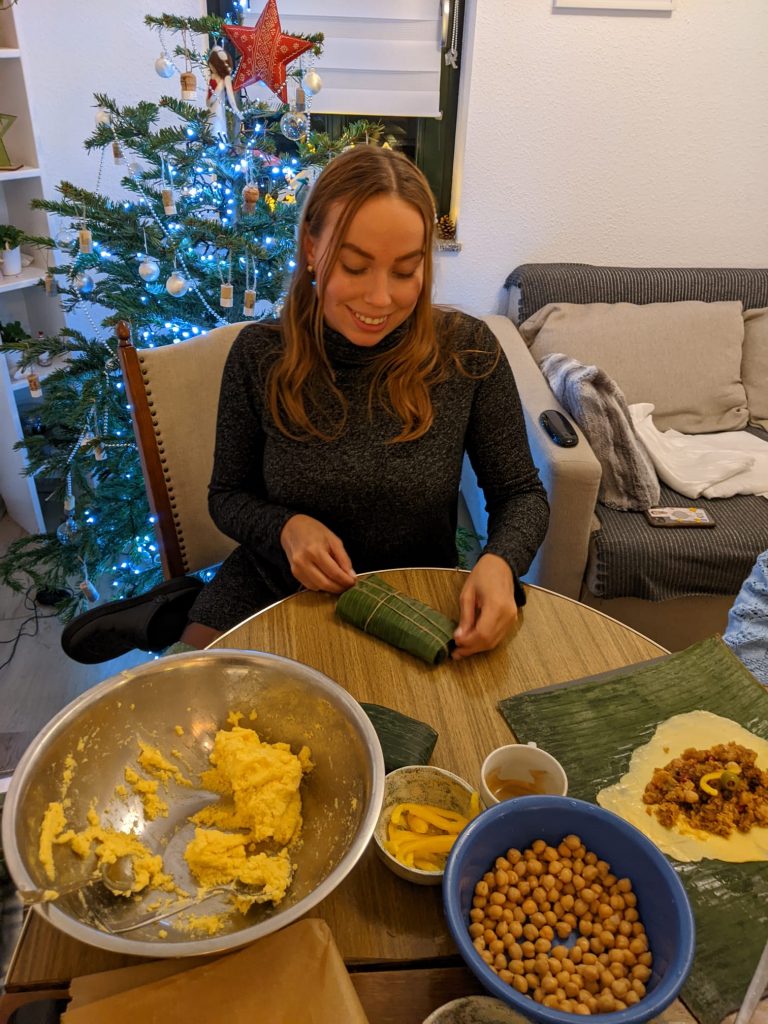
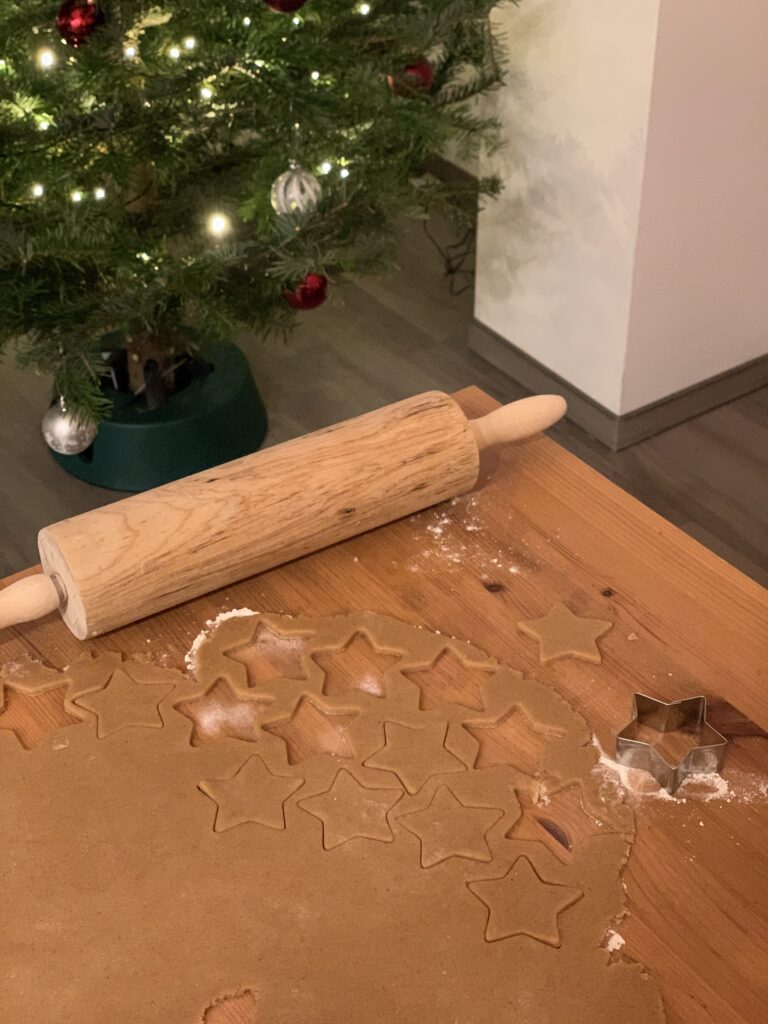
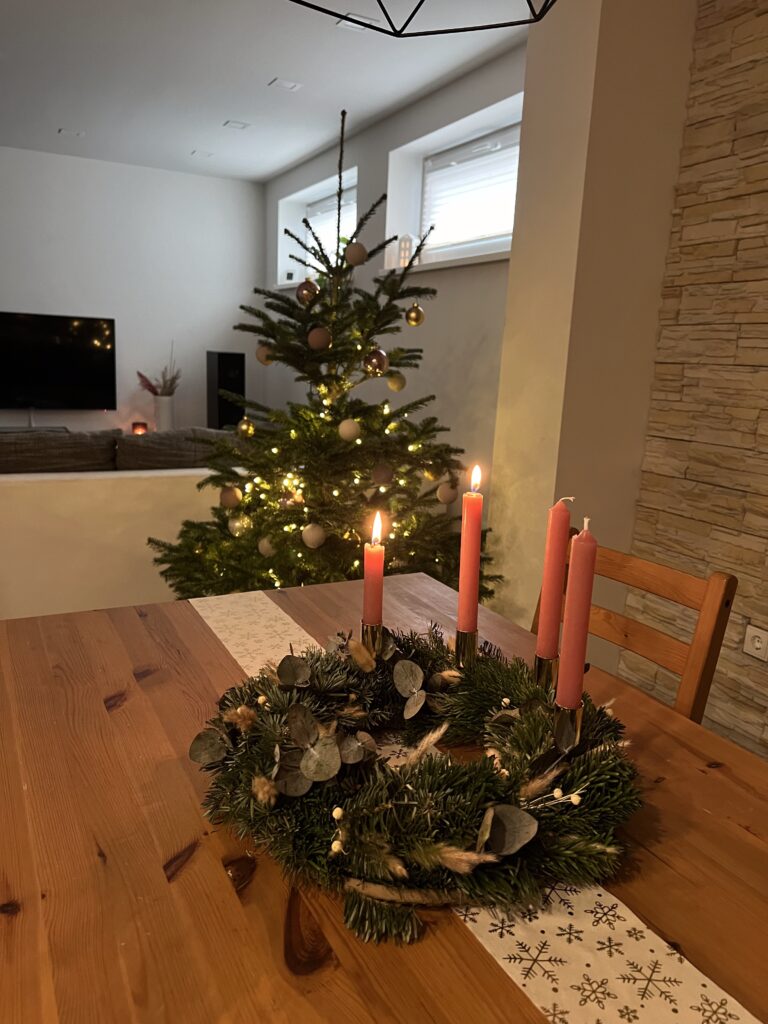
Advent calendars are one of my favorite holiday traditions. Each day leading up to Christmas Eve, you open a tiny door to reveal a surprise like chocolates, toys, or even unique treats. This year, I got a calendar from a perfume store filled with beauty products like makeup and skin care. I remember the first Advent calendar I ever got was during my exchange year in Germany. Every day I’d find a thoughtful gift from my host mom, like nail polish, hair accessories, or even concert tickets! The child in me still feels a spark of excitement every morning in December, wondering what’s behind the next door.
And of course, the Christmas market is an essential part of the Advent season in Germany. I admit, the first time I visited a German Christmas market I thought, “How can anyone enjoy this? It’s freezing outside!” But now I see the magic. Imagine wooden booths illuminated by lights, the air filled with the smell of roasted almonds, glühwein (mulled wine), and Lebkuchen (gingerbread). People come together to shop for handmade gifts, snack on warm treats, and just soak up the holiday spirit. Despite the cold, Christmas markets somehow make you feel warm inside (although that might also be thanks to the 2 – 3 cups of Glühwein 😉).
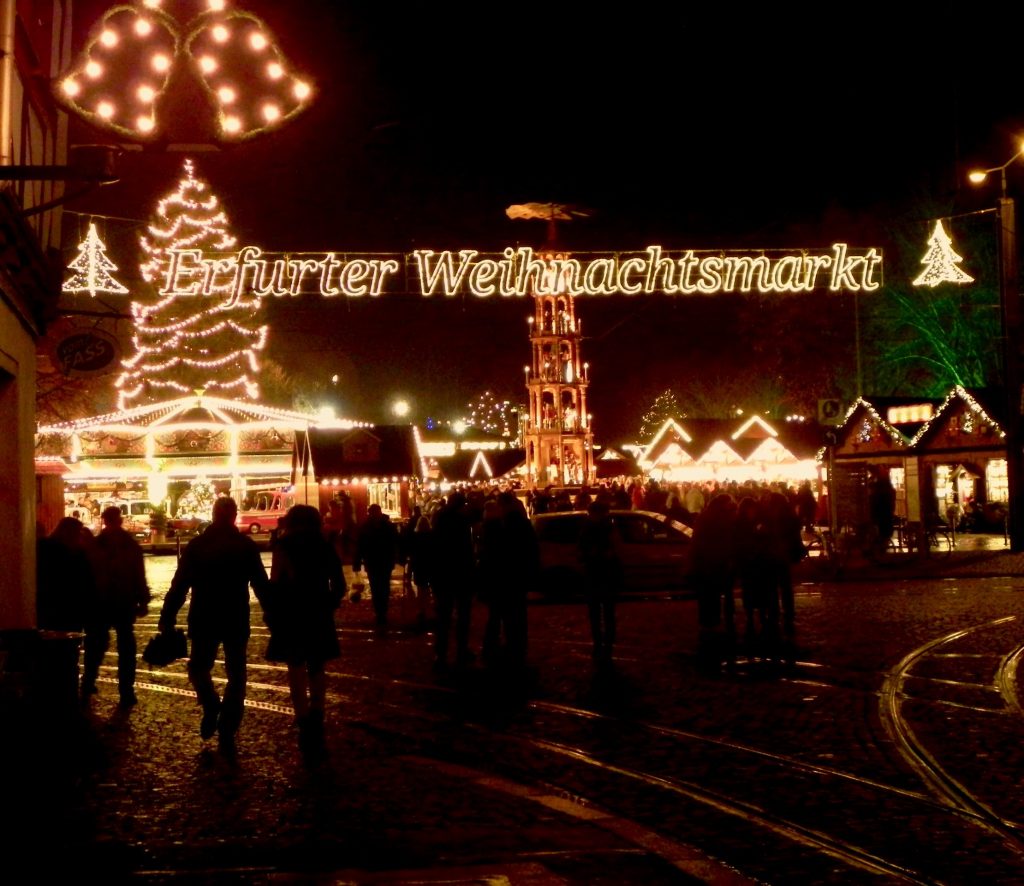
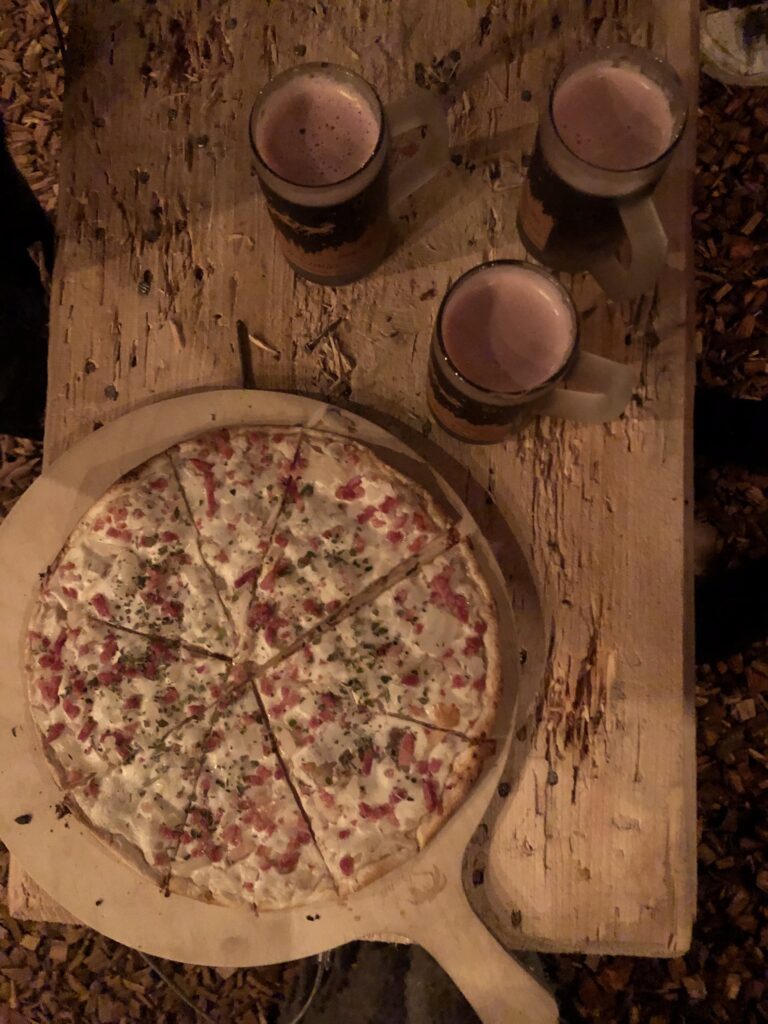
Another thing I’ve grown to love here is picking out a real Christmas tree. The first time I did it, about four years ago, I felt like I was living in a Christmas movie. Growing up in Venezuela, we always had plastic trees because of the weather. My first years in Germany were no different, I had a small plastic tree in my dorm. But now, choosing a real tree has become one of my favorite traditions.
What’s very different though is the decoration. In Germany, it’s simple and minimalistic-just a few ornaments, some lights, and maybe a garland. At first it felt strange. In Venezuela, you couldn’t even see the green of the tree because it was so full of ornaments, ribbons, and lights. And it wasn’t just the tree; every corner of the house was decorated, glowing with Christmas lights.
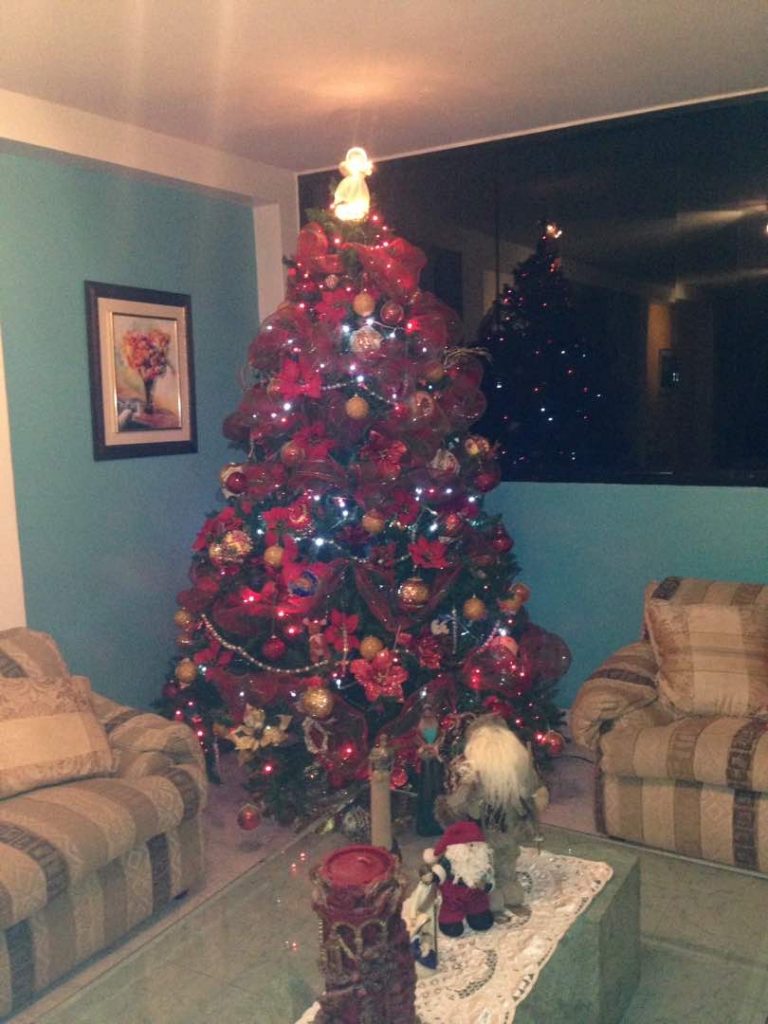
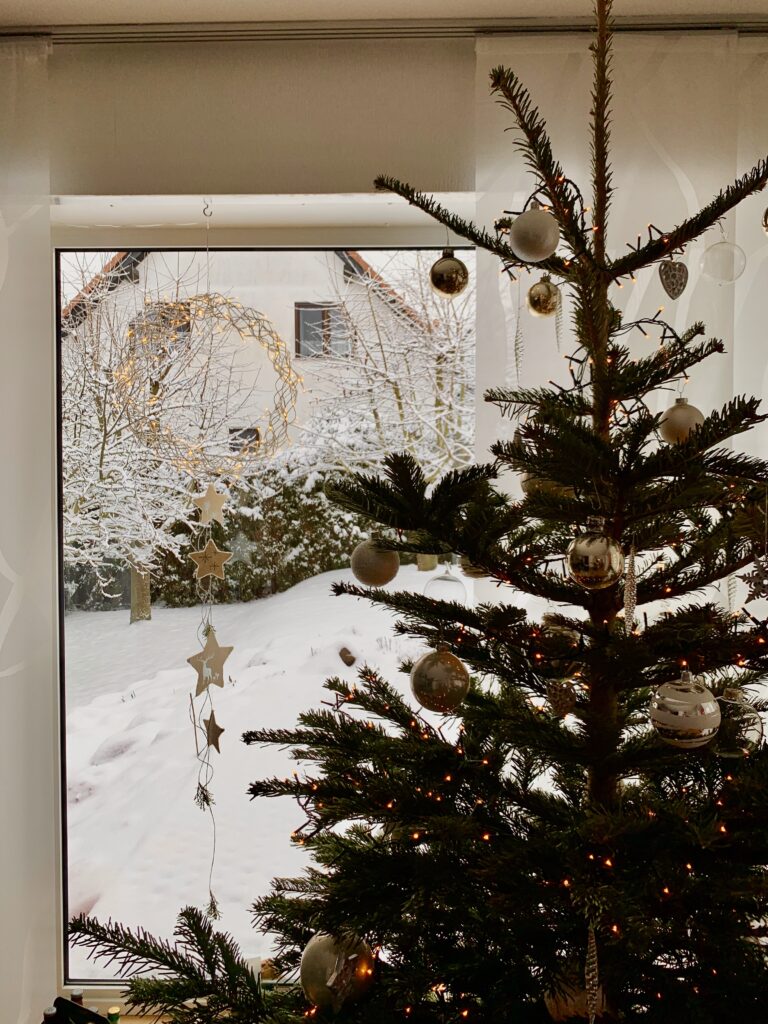
Over the years, I’ve come to appreciate the simplicity of German Christmas decorations. It’s cozy and charming, which perfectly matches the holiday vibe here.
Christmas Eve
Heiligabend (Christmas Eve) in Germany is much quieter and more intimate than in Venezuela. Here, families gather for a cozy evening, often enjoying a simple meal like sausages and potato salad. Christmas Eve is a big event in Venezuela. The whole family dresses up (we have a tradition called estreno, which means wearing new clothes for the first time), and the night is filled with laughter, music, and, of course, food. I remember one of my first Christmas Eves with a German family, I was all dressed up only to find everyone else in cozy sweaters and slippers! It was so different, but honestly, it was beautiful in its own way.
The tradition of opening presents is also a little different. As a child in Venezuela, I’d go to bed early so Santa could come and leave presents. We’d leave cookies and milk for him, and the excitement of waking up on Christmas morning to open them was magical. As I grew older, the tradition shifted, we’d wait until midnight to exchange gifts. In Germany, on the other hand, presents are opened on the evening of the 24th, usually right after dinner.
Food traditions also vary. In Venezuela, Christmas Eve is such a feast that the next few days are all about eating the leftovers. In Germany, these days are reserved for larger meals with extended family, often featuring roast goose or duck with all the side dishes. It’s a quieter, more reflective way to continue the celebration.
New Year’s Eve: Silvester vs. Año Nuevo
In Venezuela, New Year’s Eve is a family affair filled with tradition and excitement. As midnight approaches, we gather to eat 12 grapes, one for each month of the coming year, timing each bite with the 12 campanadas (chimes of the clock ). It’s a fun tradition, but I have to admit, I could never finish them all on time. We also run around with suitcases to manifest a year of travel and wear yellow underwear for good luck and prosperity. Fireworks light up the sky, and after the clock strikes 12, the younger crowd often heads out to party. The evening always begins with family but ends with celebrations that welcome the new year with joy and energy.
In Germany, Silvester (New Year’s Eve) is more about friends. A popular tradition is Bleigießen (literally “lead pouring”), where people melt small pieces of lead or wax over a flame and then drop them into cold water. The shapes they form are said to predict your fortune for the coming year.
Since living in Germany, my New Year’s Eves have become quieter. I like to have a nice dinner, usually Raclette, and wait until midnight to toast. Some years, I escape the winter and fly to warmer places like Spain to recharge my vitamin D 😄 and welcome the new year with sunshine. I no longer celebrate with big parties like I used to in Venezuela, but I’ve come to enjoy the intimacy of these quieter celebrations.
Still, the party atmosphere of New Year’s Eve is universal in both cultures. Celebrating and welcoming the new year with fireworks, toasts, and happiness fills the night, whether I’m in Germany or Venezuela. It’s a shared sense of hope and joy that makes this celebration so special, no matter where I am.
I used to think German Christmas traditions were too quiet, but now I see their beauty in slowing down and appreciating the season.
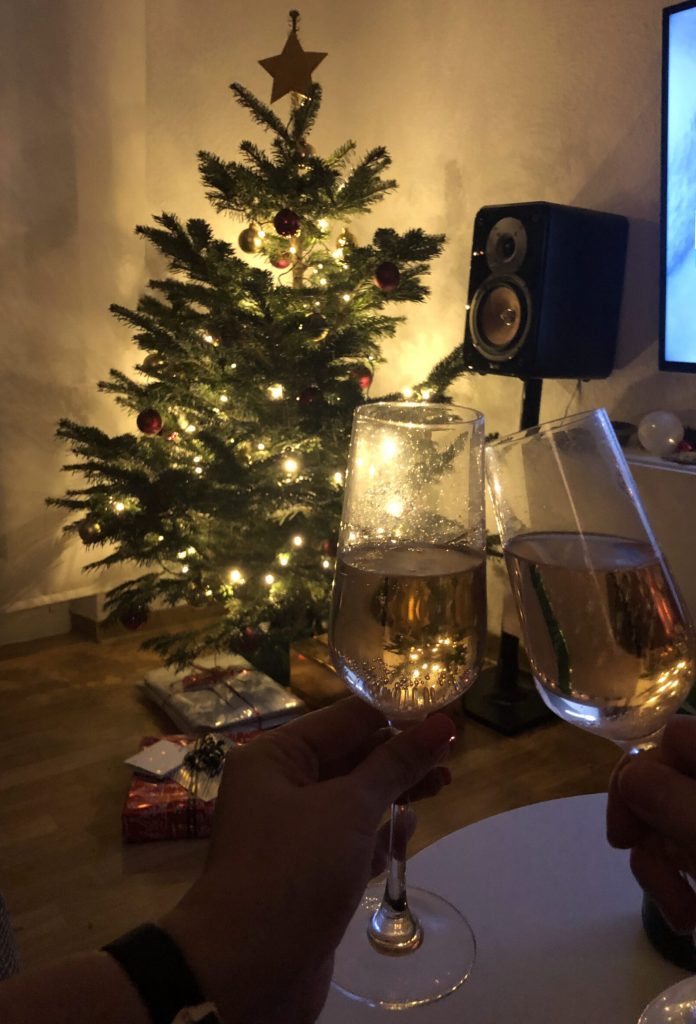
Blending Traditions
The beauty of it all is that I get to create my own Christmas traditions, blending the best of both cultures. My season begins with Advent, visiting Christmas markets and drinking glühwein. I bake cookies, pick out and decorate our tree, and gather with family and friends to prepare hallacas while listening to gaitas. On Christmas Eve, I spend time with family, and in between the holidays, I enjoy quiet moments with loved ones. For New Year’s Eve, I enjoy spending it with my boyfriend.
Although the December weather in Germany is not my favorite, I’ve grown to love the season with my unique blend of traditions.
How about you? Do you have a special way of celebrating Christmas or New Year’s Eve? Let me know in the comments, I’d love to hear about your holiday traditions.
This is just the beginning of my Germany Stories series. Next time, I’ll explore another topic about my life in Germany, so stay tuned! Don’t forget to sign up for my newsletter to get updates straight to your inbox. I’d also love to hear from you, so let me know in the comments what other topics you’d like me to talk about in this series.
Wishing you a magical holiday season,
Rebe


Leave a Reply